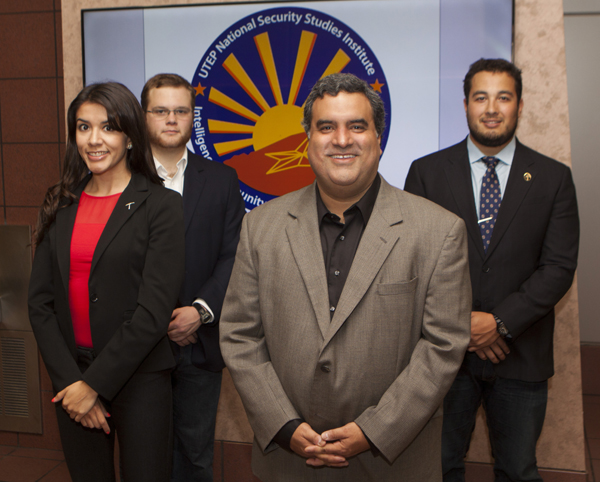Originally published October 3, 2014
By Daniel Perez
UTEP News Service
A $1.86 million grant from the U.S. Intelligence Community will help The University of Texas at El Paso expand its Intelligence and National Security Studies (INSS) program and benefit students and the nation.
The money will be used to rebrand the program into the proposed National Security Studies Institute, an Intelligence Community Center for Academic Excellence (ICCAE) that will be made up of a bigger INSS academic wing with additional faculty, new degree and certificate plans, and a new robust research arm.

INSS program leaders plan to introduce a new bachelor’s degree in strategic intelligence and analysis that includes linguistic, cultural and geographic specialties in cooperation with Asian and Religious studies, Humanities, and Languages and Linguistics, and a graduate certificate in open-source intelligence analysis that will include the use of new social media and commercial imagery.
The INSS program already offers the Master of Science in Intelligence and National Security Studies, the Master of Defense and Strategic Studies, a graduate certificate in Homeland Security and an INSS minor.
The planned institute also will create the Center for Intelligence and Security Research that will involve a hub of INSS faculty experts and students who will conduct research training, engage in sponsored research, and generate publishable papers.
“Receiving the Intelligence Community Centers for Academic Excellence (ICCAE) grant is confirmation that the INSS program is among the national leaders in intelligence education,” said Larry Valero, Ph.D., INSS program director and the grant’s principal investigator. “The competition for this grant was incredibly fierce.”
UTEP was among seven U.S. institutions of higher education to earn the ICCAE grant out of 54 submissions nationwide. Valero suggested some factors in the University’s favor were a particularly strong proposal, the INSS program’s national reputation, its border location, and the University’s 21st century student demographic.
“Our diversity played a significant role,” Valero said. “We have a strong record of placing our highly qualified and talented graduates in intelligence agencies where being bilingual and trilingual are critical.”
Students will be eligible for semester-long linguistic and cultural immersion programs in countries such as Taiwan, Morocco, Lithuania and the United Arab Emirates. They can apply for sponsored summer study of strategic languages at some of the leading U.S. centers for immersive language training such as Middlebury College and the University of Wisconsin. There also will be opportunities for students to participate in enhanced analytic training courses offered by top commercial vendors such as Lockheed Martin’s Center for Security Analysis in Alexandria, Virginia.
Among those interested in the new opportunities is Sean Curtis from Corinth, New York, who is pursuing a master’s degree in INSS and a homeland security graduate certificate. He expects to graduate in May 2015.
Curtis selected UTEP’s INSS program for its location, the variety of curriculum, academic rigor, and connections to law enforcement and intelligence organizations. He said he hopes to do intelligence work examining security issues in Africa.
The student was excited about the program’s planned expansion because it will create opportunities to learn from additional high-profile guests and new faculty members, conduct more research, and study more strategic languages that are in demand among U.S. intelligence agencies that are not offered at most universities.
“The immersive language opportunities are critical,” Curtis said. “This would expand the program’s international focus even greater and allow for the development of more well-rounded students who can translate what they’ve learned between the national and international spheres.”
Patricia Witherspoon, Ph.D., dean of the College of Liberal Arts, said the grant’s ripple effect will enhance many of the college’s programs. She praised the team effort involved in preparing the proposal to include representatives from the college and UTEP’s Office of Research and Sponsored Projects.
“Our students will be able to pursue studies in these areas, conduct research and compete effectively for intelligence and security employment,” Witherspoon said.
Linda Mais, an El Paso native who has earned a bachelor’s and master’s degree at UTEP, is a Defense and Strategic Studies graduate student who expects to earn her degree in December 2015. She said the expanded program will give UTEP students more of the kinds of experiences valued by intelligence and defense industry recruiters.
“The issues related to border violence, such as drugs, weapons, criminal alliances, all represent a serious risk for our nation,” said Mais, whose research specialties are border security and women in terrorism. “The expansion of the INSS program will allow me to continue researching and following border security patterns and trends that may be of interest to the law enforcement, defense and/or intelligence communities.”
The ICCAE grant is a great affirmation of UTEP’s INSS program, which is rapidly acquiring a national and international reputation, said Joseph Gordon, Ph.D., Colin Powell chair at the National Intelligence University in Washington, D.C.
Gordon said having the ICCAE designation is a major accomplishment. He credited the program’s success to Valero’s leadership, but also the University’s ability to leverage its location and student demographic because intelligence agencies require regional, linguistic and cultural expertise.
“The INSS program builds on the students’ background to educate them for possible careers in intelligence and law enforcement,” Gordon said. “Because the challenge of border security is likely to be with us for a long while, it should remain a long-term source of employment opportunity for UTEP graduates.”
The new institute also will play host to an annual two-day colloquia where local, regional, state and national intelligence professionals, academics and students will gather each spring to discuss issues and share their latest research. This year’s event will be conducted March 18-19, 2015, and will explore cyber threats to the U.S. government and commercial sectors. It will be co-sponsored by the registered student organization Students in Intelligence and National Security.